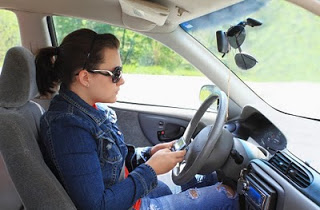Monthly Archives: July 2007

Teen Driving Privileges Linked to School Attendance
July 31, 2007
There’s a new state law in Illinois that is supposed to crack down on teen driving privileges. The gist of it all is basically that teens that are truant in school and cut classes or are expelled could have their driving permits suspended until they turn 18. Apparently, lawmakers want to provide incentive for kids to stay in school.
There is some debate as to whether this new law will work or not. Various versions of this law have been passed in other states but the verdict is still out as to how well it is working. Eighteen unexcused absences, expulsion or dropping out are three ways that teenagers can lose their driving permits in Illinois.
Skeptics wonder how much of an impact this can have on teenagers. If they are aware of this new law long before they are eligible for driving, perhaps it will make some impression on those new teens that are starving for a little independence that driving can bring. However, exactly how is this new law going to be relayed to the teenagers that could be affected by it now?
Are schools going to go out of their way to broadcast this change? Chances are they will claim that they do not have adequate resources. Plus, teenagers have to do something drastic in order to have their driving permits revoked. By the time cutting classes or expulsion are caught, it is almost too late to do anything about it anyway. And 18 unexcused absences are quite excessive. Wouldn’t it be more effective if the requirement were half that?
The bottom line is while the law has good intentions, the problems lies in reinforcing it. Schools are overextended already. How is that information about unexcused absences, truancy and expulsion going to be relayed to the powers that be? Who is planning to do all the following up? It could literally take several years before the law really catches on and the truancy problems start to decline.
In the meantime, you have teens who would likely continue to drive even with truancy problems at school. Their misdeeds could literally take months to catch up with them in the form of a revoked driving permit. And for some, they could age out before they reap any consequences. That is not much of a slap on the wrist is it? This new law is a bit hazy still on how everything is supposed to play out. It will just have to be a wait and see game.

Driving Simulation Course a Great Tool for Better Driving
July 24, 2007
There’s a new course called Tragedy Prevention whose sole goal is to educate drivers about the dangers of the road in the hopes that accidents could be prevented. This is an excellent tool for not just reckless adult drivers who need driver’s education training, but also for new teenage drivers who need to be acclimated to the ways for the road.
Book learning in driver’s education can only take teens so far. Practical experience driving the roads definitely helps but they also need to experience potential dangerous situations so that they can anticipate their next moves and possible avoid a fatal accident. This Tragedy Prevention course is definitely a step in the right direction.
While this course is geared toward reckless drivers who may have had privileges suspended, there is also a special WHEELS program geared just for teens that is filling the driver’s education need since so many high schools are no longer offering the courses. What is so great is that teenagers are put through the paces in a simulator with different situations such as a tire blowout, driving at night or even dangerous weather conditions.
Typically, a teenager will not usually experience this in a real life training situation. However, at some point in their young life, these situations may happen. And without the proper guidance and anticipation of a solution, these teens could die in an accident. The purpose of Tragedy Prevention is to ensure that these teens understand the different dangers on the road and that sometimes, they themselves are the problem.
This training class shows teens through various simulations exactly what happens if they become distracted by cell phone texting or even if they drive under the influence. For many teens, it is quite an eye opener to be faced with their potential of mortality. And while most have admitted to driving and texting or drinking, many vow after the class that they will not do it again. That is great news for the teen participants of the class.
With some money and luck, perhaps other areas of the country will offer similar programs. Only with ready access in each and every state can this class work for teens. So, if you do not have any program such as Tragedy Prevention in your area, look and see what you can do to try and bring it to your area. Talk with legislators at the local and state levels and see what you all can do to pitch in together to keep our teens safe and educated about the hazards of the road.

Coming Soon, Texting your Way to a Fine
July 24, 2007
Quite a few states have jumped on the bandwagon about banning driving while talking on the cell phone. However, the growing trend of texting while driving has caused lawmakers, especially in New York to go back to the drawing board to include texting in that ban. And after the recent fatal accident where five teens were killed, with texting as a likely culprit, the heat is really on to get the new ruling passed.
The question remains, “Will a ban on texting really help prevent accidents?” No one really knows for sure and as a result, the proposed law change is getting some mixed reviews. Some people feel that the wireless industry is not doing enough to advertise the dangers of cell phone use while driving. However, others feel that it all boils down to practicing basic defensive driving skills.
People hear that talking on the cell phone and texting has caused accidents and killed people, yet they do not hinder their own actions. Why is that? It’s just like smoking. You know that it is hazardous to your health, yet you do it anyway. The same principle applies with cell phones. Are our lives so busy and competitive that we cannot miss a single moment with our cell phones? How did we ever get along twenty or thirty years ago?
Another part of the problem is how to keep the teenagers from texting while driving. Many of them admit to doing it and know it is dangerous and still do it anyway. At some point, we have to accept responsibility for ourselves. In the case of teenagers who are still feeling their way around the whole driving thing, the parents are going to have to be the guiding force in appropriate driving behavior in teens. Of course, that means that they will have to clean up their own acts so that they can lead by example.
It is because people know better yet do it anyway that is precipitating this texting inclusion in the existing cell phone law. Sometimes, we have to help those who refuse to help themselves. And if it takes imposing fines to get the point across, so be it. The problem is that no one truly knows how much of an impact this law will make on saving lives. We’ll just have to wait and see.
Engaging Teens Does Work for Driving Safety
July 18, 2007
Allstate Insurance Company recently awarded fifty $1,000 awards to various organizations that promote safe driving for teens. National Youth Traffic Safety Month was declared for the first time this past May. Allstate Insurance teamed up with NOYS (National Organizations for Youth Safety) and issued a challenge to these different youth organizations to come up with campaigns that could help decrease the number of fatalities and injuries due to teenage driving.
You might say that many teens all over the country took to the challenge and managed some creative, educational ways to promote safe driving for teenagers. How many lives has this effort saved so far? No one knows the answer. However, this $50,000 incentive has challenged teenagers to come up with solutions and essentially has put them in the driver’s seat. What better way than to engage teens at the very thing that is the problem?
By empowering teens to come up with solutions on how to save the lives of other young drivers, you are actually opening their eyes to the fact that maybe their own actions and habits are not safe either. This is actually a pretty ingenious move on behalf of Allstate Insurance and the National Organizations for Youth Safety. Everyone knows that teens sometimes just pretend to hear adults and lectures often go in one ear and out the other. However, by putting them in charge of coming up with their own solutions to this growing teenage driving problem, these teens are getting quite an education on their own and often will fix their own habits without prompting.
This contest likely brought many teenagers face to face with their own mortality and they probably did not like it. After all, most teens feel that they are invincible and have all the time in the world. Well, when preparing for this contest, these teens likely learned about the appalling statistics on the death rate of teenage drivers and how many of these accidents could have been prevented. That kind of eye-opener tends to make most people, especially impressionable teens, sit up and take notice.
An adult relaying this information will likely be met with eye-rolling and “yeah, whatever’s.” However, when you empower your teen to come up with this information on their own, well, they appreciate it all the more. Allstate Insurance and NOYS deserve some kudos for protecting new teenage drivers on the road. Now, let’s hope that your teens sit up and take notice too.
Helpful Tips for Parents of New Teen Drivers
July 6, 2007
Ok, listen up parents! It is up to you to help your teenager become a better driver. That means some sacrifices on not only their part but yours as well. In other words, you have to take the time for extra instruction (besides what a driving school will go over). After all, aren’t a few extra hours a good investment in your teen’s future?
While your teen is ultimately responsible for his or her driving, you can help lay the building blocks for a safe, spotless driving record. Now before getting into the different helpful tips, just remember this: lead by example. How do you expect your own teenager to obey traffic laws on important safety measures if you don’t do the same? That means no unnecessary speeding, no rolling through stop signs and no multi-tasking while driving.
Ok, with the mini-lecture over, here are some of those helpful tips you should consider when teaching your teenager how to drive:
- Begin your first driving lesson by not leaving your driveway. Go over each and every button, lever and knob that your teen driver would have to operate. Go through simulations on how to use them, especially without looking. Obviously, the safest recourse on the road is to operate those gadgets without taking your eyes off the road.
- Don’t rush progress. Automatically hopping into a busy neighborhood or even on the highway is a no-no with new drivers. Choose a large parking lot and set up cones in different configurations. Practice backing up into a parking space; learn parallel parking. Practice driving in reverse.
- Once the parking lot trials are over, segue into streets with light traffic. You may have to get up early in the morning or try later in the evening to avoid the heavy commuter traffic or lunch time traffic.
- After you feel comfortable with your teen’s driving on light traffic streets, take a valium (just kidding!) and start your teen’s first lesson on the highway.
- Keep in mind that your teenager will feel self-conscious driving with you at first. Foster an open communication with him or her. Ask questions that need replies. This will keep the comments rolling.
- Plan your driving journeys in advance and give your teenager advance warning when he or she needs to turn.
- Most importantly, keep your cool. You teen will not be an effective driver if you get upset.
Many of the helpful tips above are easy to remember and much of it is common sense. However, it does bear repeating as often as necessary. And while you are teaching your teenager to drive, start looking into driving schools for them so they can gather even more experience in a safe setting without your presence.
Create your own customized Parent-Teen Driving Contract online based on the recommendations from the Driver Education Handbook for Parents. Our interactive tool will help you and your teen compose a practical contract of rules regarding driving expectations and car privileges that both parties can agree on.
